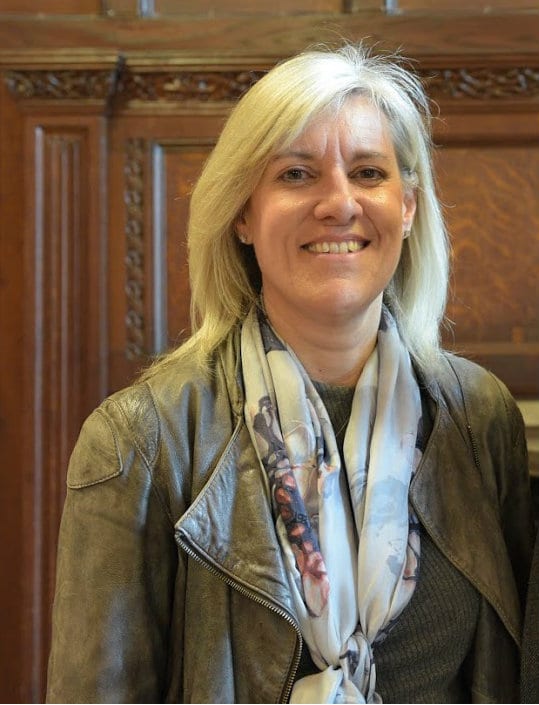 Alumna Elaine Sneller (LLB 1988), a Psychodynamic Psychotherapist, takes a look at the current crisis in mental health amongst young people.
Alumna Elaine Sneller (LLB 1988), a Psychodynamic Psychotherapist, takes a look at the current crisis in mental health amongst young people.
As someone who works in the field of mental health and a parent with children at or approaching university, the crisis in students’ mental wellbeing greatly concerns me. It is a complex issue with no easy answers or solutions but deserves to be thought and talked about.
From my own experience of working with A level students and having held a school counsellor role for four years, I believe we are not doing enough to attend to the mental health of our young people. Most mental health issues begin well before the age of 18, although they often go undiagnosed. Pressures start before young people reach university; academic performance, school league tables, anxiety about a career path and a need to be the perfect student with an enviable social life, can lead young people to feel as if they are not good enough.
Young people often feel under pressure to constantly succeed with no room to try things and fail, to experiment with different looks, music or friends and parents seem to struggle to support their children in this normal experimentation period. Sometimes they fail to talk to their children in a considered and open way about the choices their children make and the possible consequences. Many parents are under enormous pressure themselves, working long hours to make ends meet and keep their households running. I fear this lack of communication and understanding and confusion between young people and parents around issues such as the benefits-v-pitfalls of social media, gaming and other on-line activity, concerns about body image and causes of self-harm can be a contributory factor in young people not getting the support they need to enjoy robust mental health.
 It is easy for social media to be a scapegoat for all the problems of young people, but it is a complicated subject. Social media can be a useful channel for information and connection, but it can also be a source of misinformation and scaremongering and a means of putting people together with a shared negative agenda. Young people are often not sufficiently educated, helped and supported by their parents or schools around access to social media, or given an opportunity to discuss their on-line habits and what might be helpful and healthy and what might be harmful on-line both in terms of time and content. Parents and schools can play a big role in this and encourage healthy on-line habits and social media use.
It is easy for social media to be a scapegoat for all the problems of young people, but it is a complicated subject. Social media can be a useful channel for information and connection, but it can also be a source of misinformation and scaremongering and a means of putting people together with a shared negative agenda. Young people are often not sufficiently educated, helped and supported by their parents or schools around access to social media, or given an opportunity to discuss their on-line habits and what might be helpful and healthy and what might be harmful on-line both in terms of time and content. Parents and schools can play a big role in this and encourage healthy on-line habits and social media use.
There seems to be a continuing stereotype of the monosyllabic and recalcitrant teenager but, in my experience, if young people believe and trust someone is going to listen to them and not judge or ridicule, many are very willing to talk about what is going on for them and this can be an important step in improving their mental wellbeing.
So why are we seeing mental health problems presenting themselves at universities in particular? Again, this is a question without a simple answer. As I mentioned, mental health problems usually begin before a young person reaches 18 and often the problem has not come to anyone’s attention, let alone been diagnosed. So when a vulnerable young person leaves home they may be leaving behind a supportive network, or at least a familiar situation they have relied and this can escalate a pre-existing problem. They may not feel they have any one to talk to at university and may be reluctant to tell those at home the problems or loneliness they are facing particularly if there has been a big celebration, sacrifice or financial pressure in order for the young person to get to university. For many students this can be stressful and exposing and worse for those with already fragile mental health. Leaving parents and friends behind can highlight a young person’s lack of resilience and insecure sense of self.
On the other hand, some students may find university a place where they are able to get more support than at home if they are struggling with their mental health. They may not previously have considered their own mental health and it may be the first time they have thought or heard of the concept. They may find mental health is more openly discussed and considered at university, there may be more space to think about and less shame in discussing their concerns about their own mental health and self-referral to university counselling an accessible way to access help and manage their problems. This is what we should be aiming for all universities to provide for students.
Some students have been lucky enough to have parents who have done everything for them but they can then struggle with the complexities of life on their own. Conversely, students who have been left to their own devices and appear to be more independent and self-sufficient may find they have not been given the resources to manage the complexities of life on their own.
 What can be done? As a start, as intimated before, it is essential for all parents to have an open dialogue with their children and teenagers. I cannot emphasis how important this is. I would make it compulsory! Make time for them, ask them about how they’re feeling and check in with them regularly, right from the age they can talk (maybe even before), up to when they go to university and beyond. Normalise talking about emotions and share your own struggles and experiences of university or life as a young adult. Avoid judging and support them in trying and failing. Tried and tested practical interventions such as getting enough fresh air and exercise, eating well, connecting within their community and enjoying nature really do make a difference. Easier said than done of course, but leading by example can help.
What can be done? As a start, as intimated before, it is essential for all parents to have an open dialogue with their children and teenagers. I cannot emphasis how important this is. I would make it compulsory! Make time for them, ask them about how they’re feeling and check in with them regularly, right from the age they can talk (maybe even before), up to when they go to university and beyond. Normalise talking about emotions and share your own struggles and experiences of university or life as a young adult. Avoid judging and support them in trying and failing. Tried and tested practical interventions such as getting enough fresh air and exercise, eating well, connecting within their community and enjoying nature really do make a difference. Easier said than done of course, but leading by example can help.
As far as universities are concerned, they need to make mental wellbeing resources more accessible and available and improve and promote the resources they do provide.
A recent BBC report found an increase of 24% in the number of under-12s being prescribed anti-depressants in the last three years. It is clear that this issue is not beginning at university and needs to be tackled at all ages and educational levels. The average waiting time for general access to Child and Adolescent Mental Health Services (CAMHS) is now twelve weeks, and most young people referred to CAMHS will receive a diagnosis and no treatment as most young people will not reach the CAMHS threshold for treatment although they may appear, especially to their friends and family to be very unwell. There is insufficient funding for CAHMS to both diagnose and to then treat all those who need treatment. If they have not received treatment within CAHMS, and few young people do, they may progress to university with their problems unaddressed. If they have had access to CAHMS, they may find there is an awkward and insufficient transition from CAHMS to adult mental health services and universities end up being saddled with the problem and trying to fill a poorly defined space in between.
When funding cuts to mental health services lead to GPs prescribing at this level, it is clearly a growing societal concern. We all need to work together to address the issue in a holistic way and not simply look for scapegoats. Nor must we respond to complex questions with simplistic answers.
 Elaine Sneller graduated from Bristol in 1988 and went on to become a solicitor working in Property Law. She then trained as a barrister and worked in property, family and criminal law for over ten years, where many of the young people she represented suffered from drug and alcohol and mental health problems. Elaine started wondering if she would be better placed working directly with people who were struggling, rather than representing them in the courtroom and after working in drug and alcohol rehabilitation for four years, retrained as a psychotherapist, graduating in 2013.
Elaine Sneller graduated from Bristol in 1988 and went on to become a solicitor working in Property Law. She then trained as a barrister and worked in property, family and criminal law for over ten years, where many of the young people she represented suffered from drug and alcohol and mental health problems. Elaine started wondering if she would be better placed working directly with people who were struggling, rather than representing them in the courtroom and after working in drug and alcohol rehabilitation for four years, retrained as a psychotherapist, graduating in 2013.
Elaine and her husband Perry Noble feel so strongly about the issue of mental health that they are supporting PhD student Jazz Croft in her work in this area. Jazz is a PhD candidate at the Centre for Academic Mental Health at Bristol. She is working with the ‘Children of the 90s‘ group (Avon Longitudinal Study of Parents and Children) for her research. Jazz is looking at childhood trauma, psychotic experiences and proposed cognitive mechanisms that may mediate their relationship.
